


























As a Black journalist, I’ve always felt it my duty to remain objective, to let the facts speak for themselves, and to give each side a fair hearing. But as the country stands at the precipice of one of the most consequential elections in history, I’m putting that objectivity aside because, frankly, it’s failed us before. We got Donald Trump because too many stayed silent, too many looked the other way, and too many chose inaction. In the words of Maya Angelou, “When someone shows you who they are, believe them.” America, Trump has shown us exactly who he is. Michelle Obama recently spoke at a rally in Michigan, urging us to recognize what’s at stake. Her words were a powerful reminder that the results of this election will define our path forward—or backward. She laid bare the reality: a second Trump term would mean
more of the hate, chaos, and division we’ve already witnessed. She reminded us that we’re not just voting for a candidate; we’re voting for our safety, our communities, and our children’s future. “We can’t let them take away our voice,” she urged. That voice? It’s ours, and we wield it through our vote.

We’re witnessing a deliberate, strategic play to undermine and unravel the progress we’ve fought for. Think about that disturbing rally held by Trump’s supporters—full of divisive rhetoric and hostility, targeting anyone who doesn’t look or believe as they do. This rally was no anomaly. It’s a stark preview of what we’ll face in the next four years if we do nothing. This hate isn’t an accident; it’s deliberate. And it’s what they want America to become.
We can’t forget the long, brutal history that got us here. Black Americans fought, bled, and died for the right to vote. Our ancestors risked everything so we could have a voice. During the Civil Rights Movement, people like Fannie Lou Hamer and John Lewis stood against violence, intimidation, and systemic barriers, demanding a country that respects and values Black lives. To honor their legacy, we must show up and vote because if we don’t, we’re allowing those sacrifices to be trampled on. We’re allowing those voices to be silenced again. There are those who argue that journalism’s role is to be objective, to avoid “taking sides.” But objectivity, for too long, meant giving Trump the benefit of the doubt when he called for bans on Muslims, when he spread lies about immigrants, and when he refused
to condemn hate groups. Objectivity got us here. This is not the time for neutrality. The stakes are simply too high.
This election is about moving forward, about living up to the ideals we say we stand for. Michelle Obama reminded us that we’ve come too far to let someone who doesn’t represent us—or care for us—strip our power away. We owe it to ourselves, to our ancestors, and to future generations to do everything in our power to fight for a better America.
So, Black America, I urge you—let’s show up at the polls. Let’s remind those who seek to silence us that we’re here, and we’re not going anywhere. Let’s make it clear that we will not be silent in the face of hate. This is our time. Vote like your life, and the lives of those you love, depends on it—because it does.
By Gregory Stevenson
Some Houston-area educators have been relieved of duty afer charges that they participated in a teacher-certifcation cheating scheme. Harris County District Attorney Kim Ogg made a bombshell announcement that criminal charges were fled against fve people who allowed more than 210 unqualifed teachers to work in local school districts. Houston ISD ofcials say three employees, who have been arrested, are relieved of their duties pending further investigation.
Te educators include Vincent Grayson, the boy’s basketball head coach at Booker T. Washington where he’s worked for nearly 20 years; Nicholas Newton, assistant principal at Booker T. Washington; and LaShonda Roberts, assistant principal at Yates High School.
According to Mike Levine, of the DA’s Public Corruption Division, this scheme was used to certify more than 200 unqualifed teachers all now practicing or having practiced here in our Texas public schools and in districts across the state. Levine says Grayson grossed more than $1 million from the scheme.
“Vincent Grayson is the kingpin. He’s made $1,090,000 from this scheme, as best we can tell,” Levine said.
Earlier this year, Grayson was nominated for High School Coach of the Year at the Houston Sports Awards. He was described to have had an impact on the basketball court at Booker T. Washington High School, leading the team to their frst-ever UIL state
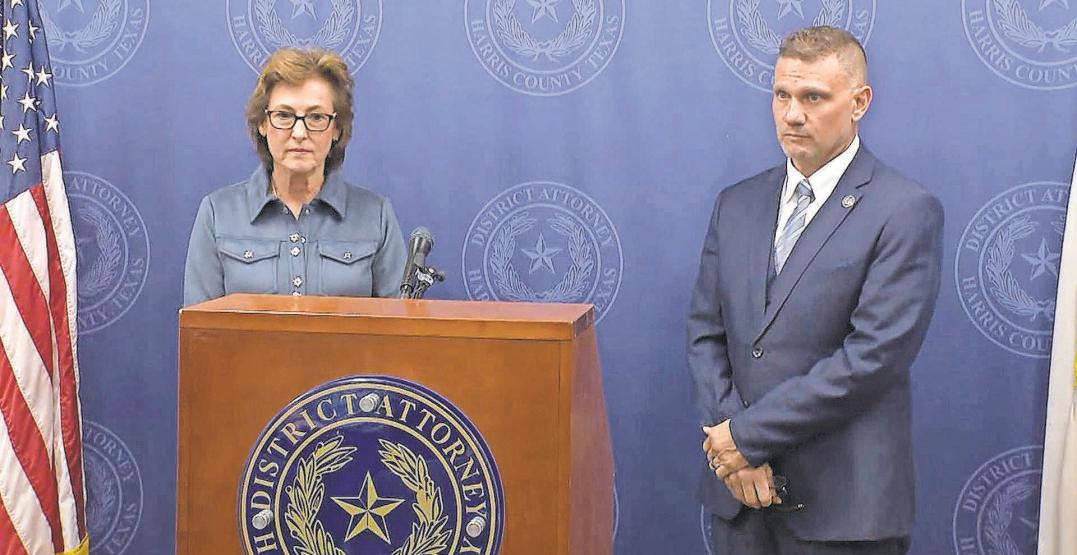
tournament in 2023, a signifcant milestone for the high school.
Levine said candidates would pay Grayson around $2,500. He then would forward roughly 20% of that money to Tywana Gilford Mason, an employee of H-TEC (Houston Training and Education Center), who served as the proctor who allowed an impersonator to sit for the exams instead of the actual teacher applicants.
Grayson would then allegedly instruct the candidate where and when to take the test.
Tey would come, show ID, sign in and leave, Levine stated.
A few minutes later, Newton, the proxy tester, would reportedly sit in their seat, take and pass the test.
Darian Nikole Wilhite reportedly acted as a “corrupt” testing proctor at one of the centers. Roberts is charged as a recruiter and referral agent who brought in roughly 100 individuals who sought the services of the “impersonator test taker.”
Te district released a statement following the arrests:
“Any educator who engages in conduct of this nature abdicates their responsibility to our students and to our staf and represents a complete betrayal of the public trust....Additionally, if it is determined that any teachers currently working in HISD participated in this scheme or passed their certifcation exams
fraudulently, we will take swif action to terminate their employment with the District.”
“People hate public corruption because generally, it involves thef of taxpayer money; money that we’ve collectively entrusted to those we elect and to those that we hire to be our government,” said Ogg. “And these kinds of crimes weaken the public’s trust in the government itself. But this case is worse than that.”
Ogg said the fve people who have been charged with two counts each of engaging in organized criminal activity, will face frst-or third-degree felony charges that can carry sentences ranging from two years to life in prison.
Worse yet, according to Ogg, of the 200plus teachers who received allegedly fraudulent teacher certifcations, at least two are convicted sexual predators, who once falsely certifed, had access through their employment to under-aged children, on campus and of.
“One has been charged with indecency with a child; another, with online solicitation,” said Ogg.
Ogg said the extent of this reported “scheme,” which goes back as far as May 2020, will never be fully known.
“But we know that at least 400 tests were taken and at least 200 teachers falsely certifed. We know that co-defendants collectively profted in the amount of at least $1 million,” added Ogg.
Te Houston City Council has approved $2 million for a community-driven crime-prevention pilot known as “credible messenger.” Tis program pairs former justice system-involved individuals as mentors to youth facing similar challenges. Te nonproft Collective Action for Youth leads the initiative.
Credible messenger mentors are known to improve justice outcomes, such as reducing re-arrests, anti-social behavior, and enhancing community relations, per the council’s agenda.
Te credible messenger model began in 1979 with Black Panther Eddie Allis and incarcerated men who created a grassroots mentoring approach. Jonathan Rodriguez,
who was incarcerated for over a decade, shared his journey from hopelessness to purpose, aiming to help young people avoid similar struggles. Derrick Curry, who previously worked with at-risk youth, highlighted how his own experiences in poverty make him relatable and efective as a mentor.
In 2013, New York City’s implementation of credible messenger programs reduced recidivism by 50%, showcasing its impact.
Houston Council Member Tarsha Jackson championed the city’s investment, highlighting that community-led eforts play a critical role in making neighborhoods safer.
“Tese types of investments actually help make our community safe,” Jackson said.
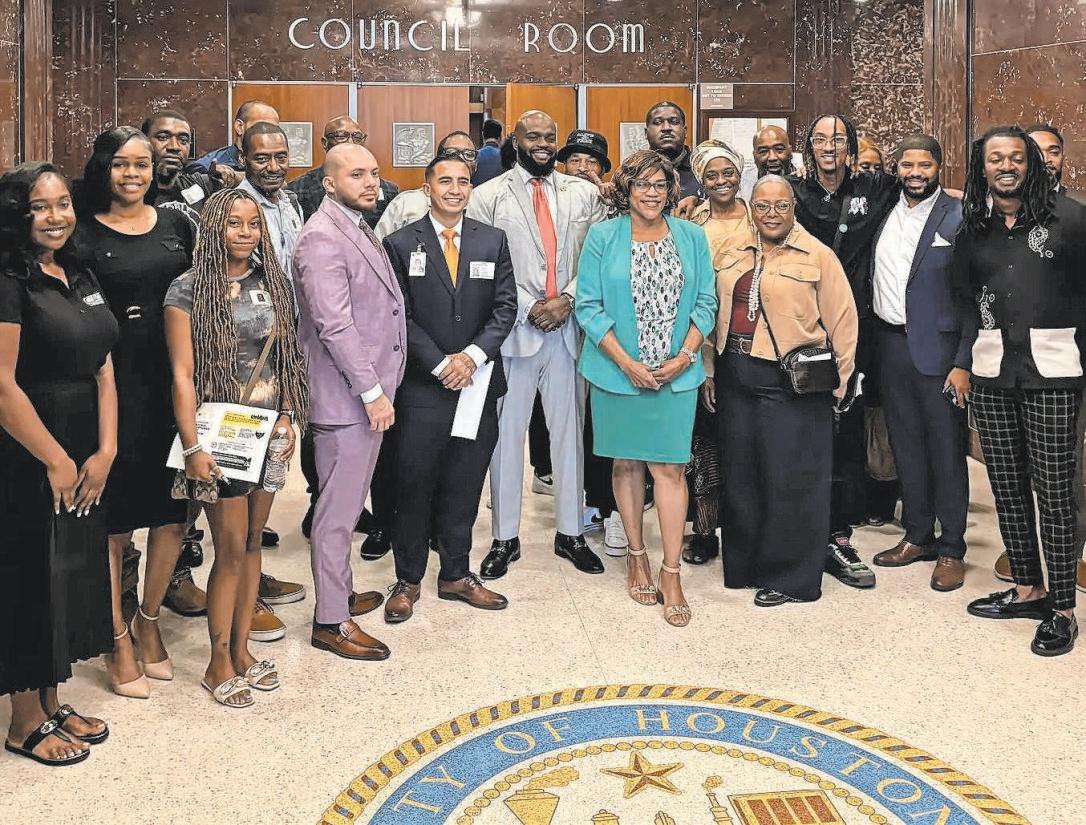
By Tannistha Sinha
Houston City Council has approved two affordable housing projects — the Ariza Park Row and Orem Circle projects — after a heated debate last week.
Critics argued against providing developers with over $800,000 in tax breaks. Others advocated for the urgency of affordable rental units for low-income tenants. Julian Ramirez was the only council member who opposed the project.
Earlier this month, Council members unanimously approved a tax break deal for the Allora Med Center project, 184 affordable units for residents making 60% to 80% of the area’s median income (AMI) and 182 units priced at market rate.
Ariza Park Row will have more than 300 units, while Orem Circle in Southeast Houston will have 270 units, with 139 affordable units.
Houston-based developer Texas Group is seeking a 100% property tax exemption for Orem Circle, which will use a state program called Public Facility Corporations (PFCs). Developers usually don’t have to pay property taxes for up to 60 years if they pledge to make 50% of the units affordable so low-income families can access them. By law, the city has to approve the tax exemption. Texas Group commissioned a report that it wasn’t necessary to reduce rents in exchange for tax savings, a claim critics vehemently dispute.
Developers who take advantage of the tax break also have to pay the Houston Housing Authority (HHA) a fee for the affordable housing units— between 10% and 15% of the developments’ excess cash flow. The Orem Circle project could reportedly bring in more than $13 million in cash, while Ariza Park Row and Allora Med Center projects could bring in nearly $5 million each for the HHA.
Council members Amy Peck, Julian Ramirez, and Fred Flickinger delayed voting on the agenda items. Peck argued that the area gets flooded because it is located on Blackshaw Street, adjacent to the Addicks Reservoir, and that such housing units needed to be in “the right location.” Housing Department Director Michael Nichols supported the plan and said using tax exemptions to build affordable housing is “a great idea.”
Ramirez said the city does not have enough information to evaluate the deal and that it is important to understand the project and partnership with HHA, which is not a city department but needs the City Council to approve tax deals.
Ramirez delayed the three proposals earlier, arguing that the Orem Circle project “is not affordable enough” for the residents of Sunnyside.
“When you have a plan for at least 50% of the units to be above market rate, that sounds like gentrification to me,” Ramirez said.
He argued HHA needs to “do its job” and negotiate deals that are actually affordable and serve those at a 30% and 50% AMI, not just market rate and above.
Ramirez suggested the council use Public Facility Corporations (PFC) to generate affordable housing not just at market rate, instead of giving developers tax abatements when “they don’t pay any taxes at all for housing that the market would’ve provided anyway.”
Mayor John Whitmire has expressed skepticism of the HHA’s current leadership, especially President and CEO David A. Northern Sr., who defended the project.
“It was a major concern how the housing authority was being operated, lack of transparency. We’ve got new board members, but there are still some issues concerning the process. The same developers keep getting additional projects about the
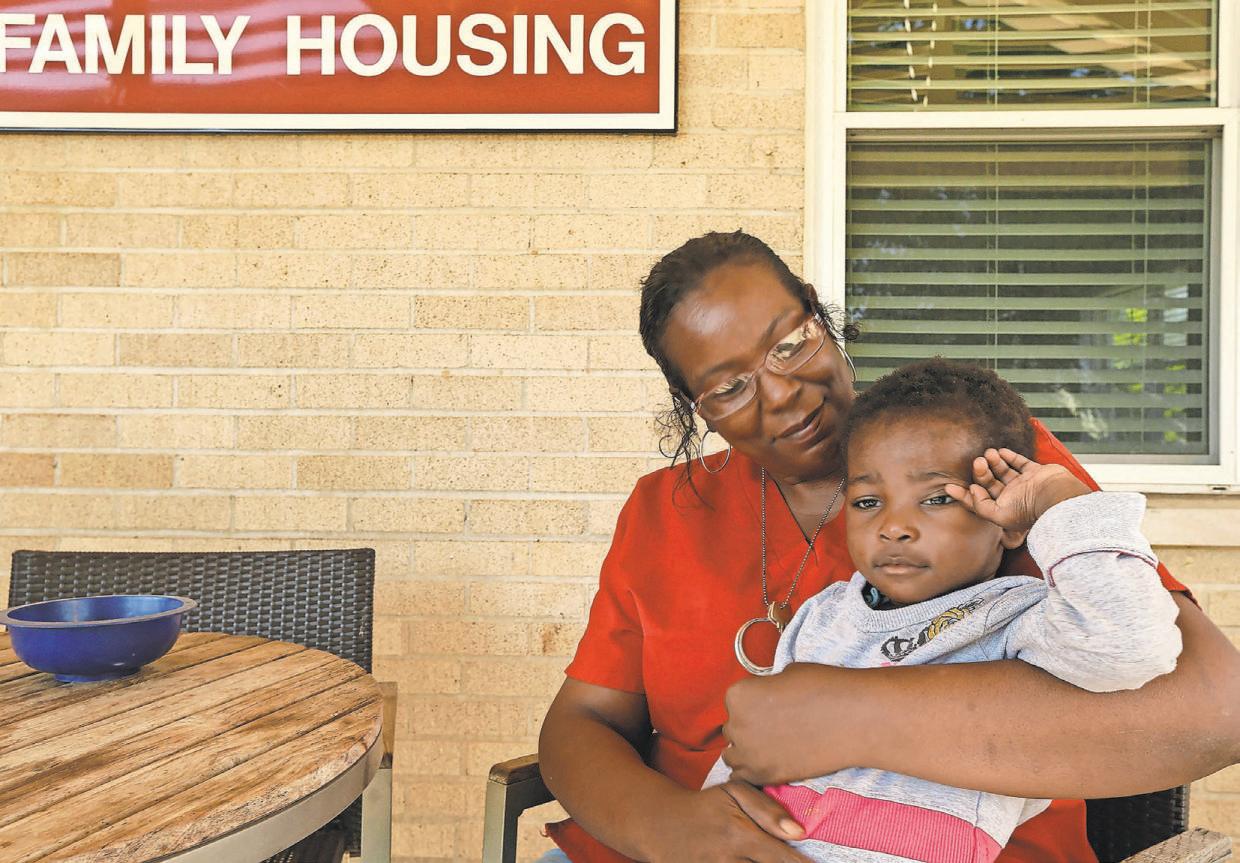
lack of designated space for low-income,” Whitmire said.
District F councilmember Tiffany D. Thomas defended HHA, labeling the criticism against its leadership “problematic” when the administration has not met with Northern Sr.
“The reason why Houston is on national news about homelessness is because of the housing authority, not exclusively for the Coalition for the Homeless, because they have their vouchers for us to house the unhoused,” she said. “So to make the point that they’re not transparent is an attempt to assassinate someone’s character.”
In defense of the organization, she said out of all the Houstonians HHA serves, 86% are Black, which is why the administration often considers it a “Black agency.”
“The playbook is not to trust Black people in leadership and money. If you can’t get us on like ethical practices, then
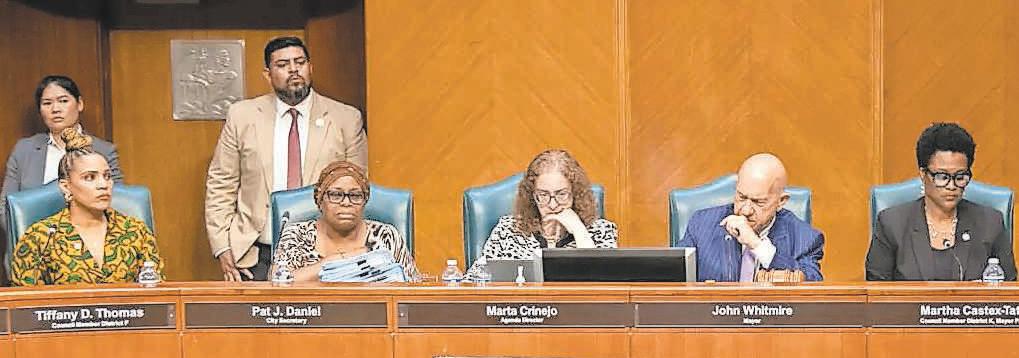
you’re gonna attack by character because we have to be 20 times more transparent,” she said after the council meeting. “I can’t let that happen.”
Thomas said last week the question of housing affordability involves gentrification, the displacement of Black people, and “stabilizing the Houstonians who need to return to their neighborhood.” Council
Member Letitia Plummer also supported the proposals.
“Third Ward is no longer majority Black. No one’s talking about the 44,000 units we lost to Harvey,” Thomas said. “We still have to replace those. Every delayed vote gets us further away from that. We have people that still need market break units in their neighborhood. They still need 80% AMI units in their neighborhood.”
For Ramirez, “race has got absolutely zero to do with” his decision.






















































Nearly 30% of Harris County’s 2.7 million registered voters participated in early voting during its first full week, either at the polls or by mail. As of Oct. 29, Harris County recorded more than 876,100 votes. Preliminary data from the Texas Secretary of State show that during the first week, 686,935 voters cast ballots in person, with an additional 41,992 voting by mail, totaling 728,927 early votes so far.
This sets a new record for in-person votes in Harris County during the first week of early voting, surpassing the previous 2020 record by 58,161 votes. Mail-in ballots also set a record, with over 7,000 more than in the same period in 2020. Currently, about 27% of Harris County’s voters have participated.
In neighboring Montgomery County, 127,670 voters cast ballots during the first week, alongside 8,887 mail-in ballots, totaling 135,557 votes — a rise of over 40,000 from 2020 and representing roughly 30% of its registered voters.
Fort Bend County also saw record-breaking participation, with 179,052 ballots cast during the first week. In-person votes reached 173,837, with 5,215 mail-in ballots received. This marks about 32% of the county’s registered voters, exceeding 2020’s total of 141,481 for the same period.
Nov. 5
In Galveston County, early voting numbers rose by 13,164 compared to the first week of 2020, with 83,894 people voting in person and 4,032 by mail.
Statewide, 5.4 million Texans have cast their ballots, with 5.1 million in person and over 270,000 by mail. This accounts for around 30% of the state’s 18.6 million registered voters. All mail-in ballots must be postmarked by Nov. 5th. Getty
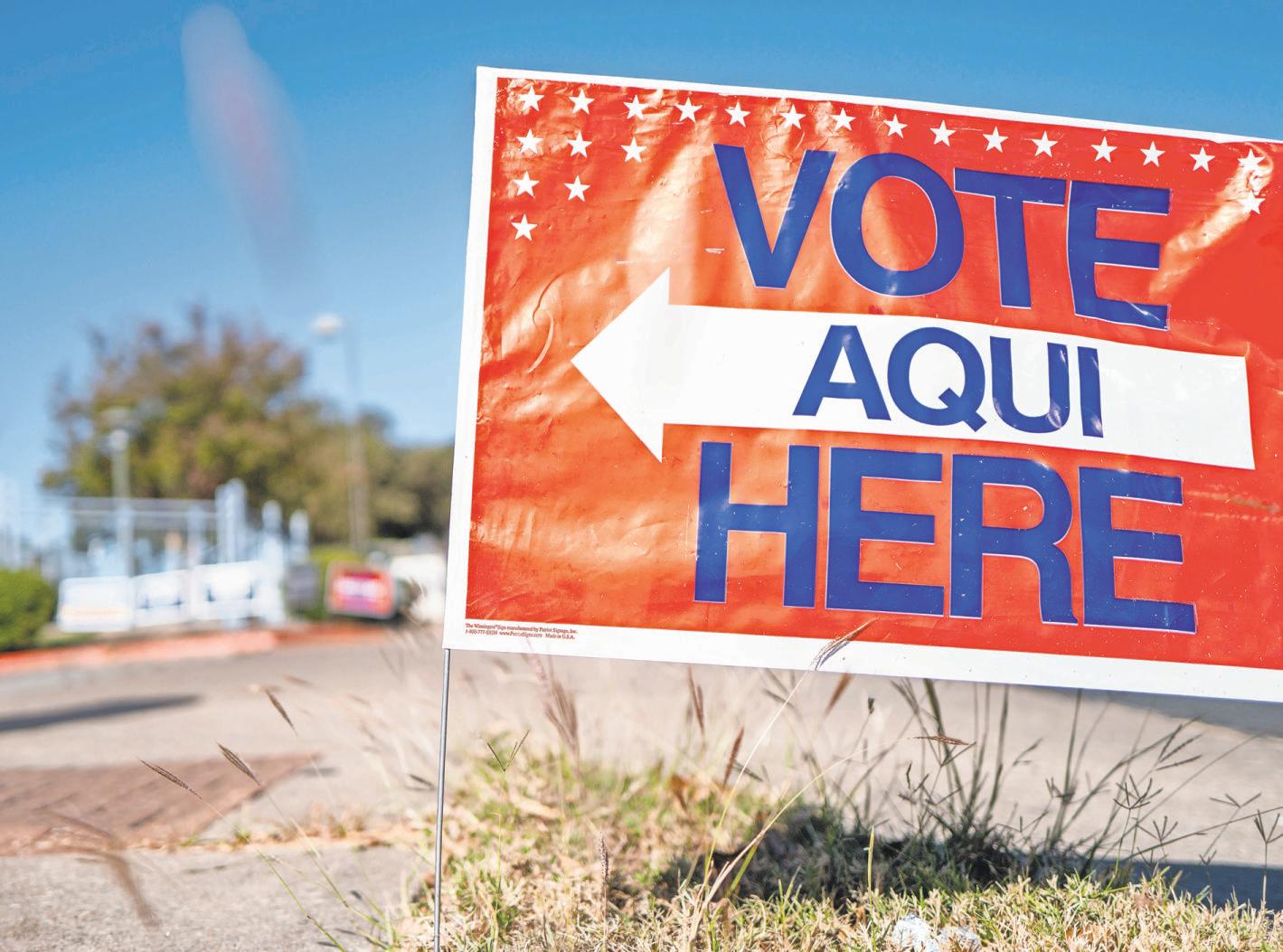




By Aswad Walker
For most, the central question surrounding this year’s presidential election is which candidate—current Vice President Kamala Harris or former president Donald Trump—will make the best Commander-in-Chief.
But there’s another question U.S. voters will be answering as they cast their votes nationwide; a question few are openly discussing—is America ready to elect a Black woman president?
The Defender asked this question of several Black women who have made a name for themselves via their service to society from positions of elected office or via community-based organizations. Here’s what they had to say:
Although America may elect Kamala Harris, the country is not yet ready to elect a Black woman as president. While it sounds appealing, and many claim they have no issue with a Black female president, my lived experience as a Black woman in leadership tells a different story. Until America confronts its racist past, recognizes the continuation of these systems today, and provides reparations to Black communities harmed by state-sanctioned violence
When our rights are on the line we fight and when they’re on the ballot we vote, because we’re not going back.
for generations, we will remain far from truly listening to and valuing Black women’s leadership. America may be ready to elect a Black woman as president, but the real question is: what kind of Black woman is the country willing to follow?
This question is so heavily loaded that answering it isn’t necessarily that simple. Yes, from a global perspective, the U.S. is behind other democracies in terms of women in executive positions. Still, this question hints at the deeply ingrained racism and sexism that exists in cultures and politics throughout the world. Women are often targets of hate and discrimination; especially Black women. Was America ready for the first Catholic president (John F. Kennedy), the first Black president (Barack Obama), and even the first woman president (Secretary Hillary Clinton), who actually won the popular vote by a comfortable margin? What we do know is that there will always be two versions of America: one that is ready for this moment and one that will never be ready. I would say America is ready for great leadership, and in this election that’s Kamala Harris, a candidate who happens to be a highly intelligent, phenomenal Black woman.
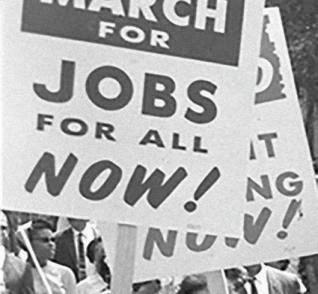

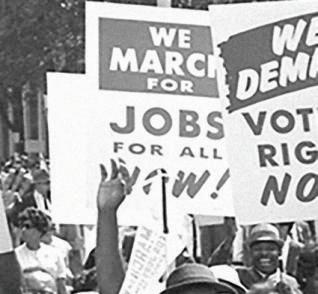

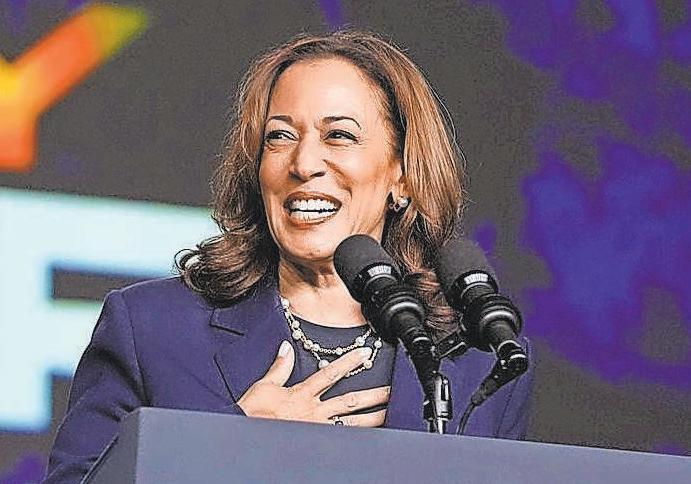
Houston-area Black women change agents and community servants weigh in on the question ‘Is America ready to elect a Black woman president?’ Credit: AP Photo.
Quite honestly, Black women are the mothers, nurturers and builders of generations. With the innate ability to push past obstacles and get things done, we capitalize on our unique perspectives and great ideas. We are bold, resilient and strong all while being intuitive, loving and compassionate to all. Leading homes, teams, companies and communities, I have no doubt we can run this country!
READ MORE BLACK WOMEN WEIGHING IN ON THIS QUESTION







If we do our part and show up to the polls, we will make history (again)!
Let’s vote for progress and the future we deserve. Vote for the leader who’s been fighting for us for years.
Election Day is November 5th.
Vote for Kamala Harris.
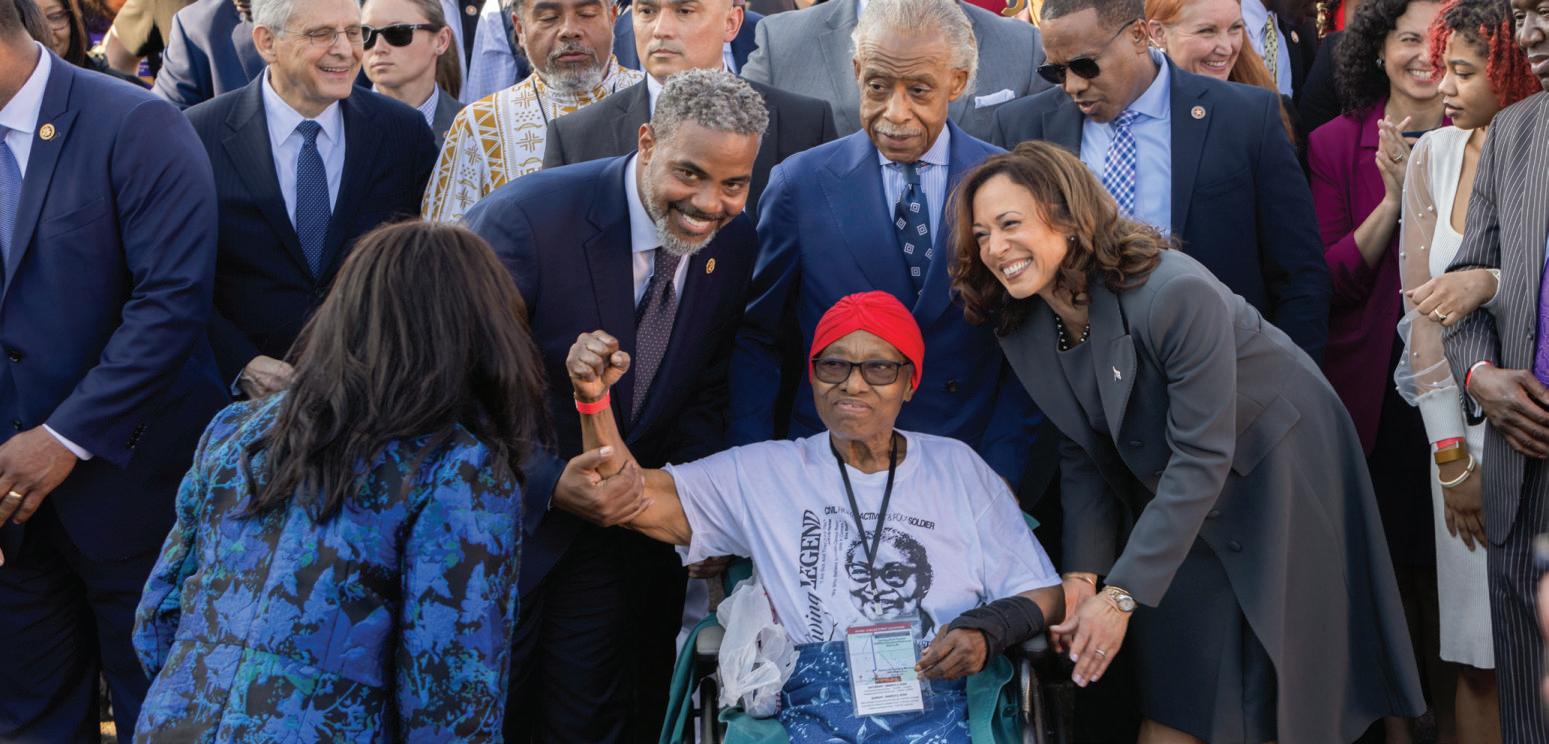

By Tannistha Sinha
From the bond money, $445 million will reportedly go into campuses that will lose one in four students by the 2028-29 school year.
HISD saw a 9% decline in enrollment this year, with around 168,000 – down from 184,000 students last year. Several campuses are also projected to have low enrollments but might receive a substantial portion of the bond money. In defense of this, Judith Cruz, a member of HISD’s bond Community Advisory Committee, said these campuses still need funds for HVACs and safe classrooms and HISD cannot wait around for the next bond because it takes years for construction to begin after a bond passes.
“We’re in the first world country and I’m just shocked that this should be a debate,” Cruz said. “Our students and our teachers deserve to be in the best buildings possible.”
The ballot in Harris County under Proposition A says, “THIS IS A PROPERTY TAX INCREASE.” By law, HISD is required to include this statement even when the bond will not raise property taxes. However, HISD documents show that with interest, the bond will cost taxpayers $8.9 billion over three decades.
Cruz said she supports the bond, which is not her endorsement of Miles’ leadership but a “hundred percent about what our kids need.”
Proponents of the bond tried to dispel concerns among parents and teachers about the bond being used as discretionary funds. Veronica Garcia from Houstonians for Great Public Schools said the bond is a contract with labor and not much can be changed. For example, if Miles decides to use the funds to expand NES schools, he will not be allowed by law to do it. Garcia said she was unsure when another bond might be proposed and how long the state will intervene. To her, the investment in students will “outlive the current administration.” She also reminded the audience the last time HISD prioritized elementary schools through a bond was in 2007. “The reality is we have thousands of children that are in unsafe, unhealthy classrooms,” Garcia said. “In today’s day and age, when there are several campuses that don’t have the necessary security upgrades, single points of entry to ensure that our kids are safe from an unspeakable tragedy, that, to me, expresses a sense of urgency.”
Organizations for the Bond
• The Greater Houston Partnership
• BakerRipley
• Children at Risk
• Good Reason Houston
One of the hottest issues on the ballot in Harris County is the bond for the Houston Independent School District. The $4.4 billion bond is the largest in Texas history. Many agree the money is necessary, but the center of debate has been whether a district embroiled in controversy deserves the funds.
The biggest issues for parents, students, teachers, board members, and community members arguing for and against the bond are the distrust toward state-appointed HISD Superintendent Mike Miles and his overhaul of the district with his New Education System (NES), job cuts, and teacher retention approach.
Last week, Parent Teacher Organizations from Crockett and Travis elementary schools, among others, hosted a panel moderated by Councilwoman Abbie Kamin to understand the consequences of voting for or against the proposal on the ballot.
The bond aims to raise money for HISD’s plans to address three issues:
• Safety and healthy campuses - $1.1 bil
• Preparing students to be “future ready” - $1.1 bil
• Restoring campuses - $2.2 bil HISD plans to pay it back by levying additional property taxes over three decades if voters approve the proposal in November.
In August, HISD unanimously passed two propositions:
Prop A asks for $3.96 billion for construction, infrastructure, renovations, school safety, and security;
Prop B asks for $440 million for technology upgrades.
While most school districts in the state hold bond elections every five to six years, HISD’s last bond election was 12 years ago because of distrust in former leadership.
The 2012 bond left HISD with $1.7 billion in outstanding debt and $664 million in interest payments. If Prop A and B are approved, this debt will increase to $10.9 billion. With the bond funds, HISD plans to rebuild 22 elementary and middle schools and renovate or expand 16 campuses. Eight schools will be relocated to another campus under the district’s “co-location” plan.

HISD is funded by debt service, nutrition, maintenance, and operations. If the bond passes, the old debt will be added to the new bond debt. HISD also has a “rainy day” fund that acts like a savings account and must have three months of operating costs by law, i.e., around $600 million. Hence, if HISD uses these funds that are intended for salaries, curriculum, and making classrooms comfortable, toward infrastructure, it will be hard for the district to replenish the funds.
PROPOSAL BREAKDOWN
Safe and healthy schools
- $1.04 billion
• Security upgrades (263 campuses; 25
non-campus facilities): $384.16 million
• HISD police upgrades: $2.15 million,
• HVAC upgrades (188 campuses): $508 million
• Lead abatement (134 campuses): $149.62 million
Future readiness - $1.07 billion
• Three new CTE centers (in North, South, and West divisions): $375 million
• Renovation of Barbara Jordan Career Center: $50 million
• Pre-K expansion: $200 million
• District-wide technology and IT upgrades: $445 million
School restoration - $2.28 billion
• For renovations, rebuilds, and expansions in 43 campuses.
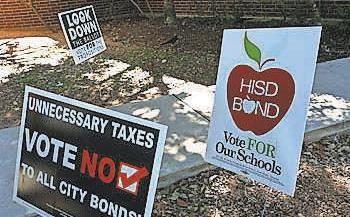
Considering the outstanding debt that HISD already has from the 2012 bond and the debt that will accompany this one, opponents are concerned about how the district will pay back the total debt of up to $10.9 billion.
Tish Ochoa from the Supporters of HISD Magnets and Budget Accountability (an active parent-run Facebook group), said campuses like Booker T. Washington have upgraded facilities but its enrollment is declining because of a lack of quality of education.
“Unless there is something done to stem the hemorrhaging of our families and great quality teachers, and that is not building a pretty new building, then I have real concerns about how this money is being spent,” she said.
Ochoa adds she is voting “no” because Miles has shown isolation from the community.
“So many of us are scared to send our kids to school on a super hot day because of what could happen with the AC. But the systematic dismantling of our district, the unplanned and widespread expansion of NES, and a permanent loss of 50% of our principals and teachers, show me that Mr. Miles doesn’t understand the needs of this district. And I don’t want the biggest bond in Texas history created under that vision, where the leaders’ vision of our district does not align with our community’s vision.”
Ochoa said Miles used ESSER funds to expand NES from 28 to 130 campuses instead of HVAC issues. She acknowledges the need for upgrades and infrastructure but does believe “it is the wrong bond at the wrong time” because of rushed community engagement and confusion under a newly-appointed board and new teachers.
However, she believes people might change their minds if they are given more time, “meaningful” engagement with the community, and a smaller bond proposal. If the bond fails, Houstonians will be the first in Texas to reject a billion-dollar bond. Tracy Lisewsky from the Supporters of HISD Magnets and Budget Accountability, said the bond allocations are “conflated.”
“There’s clearly confusion at the very least as to what’s being spent or not being spent,” she said.
By Aswad Walker
With Election 2024 touted as the most important election in our lifetime, much of the conversation between politicians, media and community advocates centers around voter turnout.
More specifically, a huge spotlight has been placed on non-voters—individuals who say their vote won’t make a difference, the entire political system is broken, both political parties are the same or all of the above.
But not everyone believes that line of thinking. In fact, several Houston-area community advocates beg to differ.
Nefertiti G, a mother of three, has been part of the political universe her entire life.
“Politics, I guess, that’s my birthright,” said Nefertiti. “My mother being an active participant in the civil rights movement, my grandparents’ generation, my church family, they all stressed to us the importance of voting.”

Nefertiti, who heads her church’s political action committee, is crystal clear on voting’s benefits.
“From my perspective, voting impacts the quality of my life because voting allows me the opportunity to voice my opinion and to impact or persuade public policies and what’s best to serve me, my family, friends, and my community as a whole,” she said.
“I know a lot of times, we hear ‘Vote your interests.’ But when I vote, I go deeper than that. I think of my interests, I think of my family, my friends, and my community and what commonalities or what struggles everyone is facing.”
Nefertiti views the notion that voting doesn’t matter as a danger.
“That’s the worst thing you could think. Voting matters. When you have that apathetic view that voting does not matter, this is how policies don’t get changed. This is the holdup to victories in local and state elections. One person has that thought, then 10 people have that thought. With some elections, people win by 20 votes. The margin between winning and losing is that close. Every vote counts.”




Just as no two homes are the same, neither are their owners. Through truly personalized service, Origin goes above and beyond to find just the right loan for your needs. Our experienced lending advisors work to create custom solutions for a wide array of customers, including first-time homebuyers. Start your conversation today at Origin.bank/BuyAHome.



Zakiya Newman serves as the Harris County Democratic Party’s outreach director. A graduate of Houston’s KIPP Spirit, Newman earned her college degree from Elizabeth Clark College in Portland, Oregon.
While in Portland, Newman became fascinated by the city’s long history of gentrification, environmental racism, and the illusion of white supremacy. From that knowledge, Newman began creating, organizing and coordinating programs to bring awareness to those topics and more, helping fellow students become more civically engaged.
Upon graduating and returning to Houston, the controversies, lawsuits and mud-slinging in Bayou City politics compelled her to get politically active.
Working on the campaigns of Beto O’Rourke and the late Sheila Jackson Lee allowed Newman to gain organizing experience that prepared her for her current role with the HCDP.
And she has a ready word for those who doubt voting’s power.
“Not voting is a vote; a default vote for most likely the Republicans,” said Newman. “Republicans know that a large voter turnout, especially in urban areas or areas with
demographics like Harris County, is very dangerous to their political agenda. So, you are unknowingly abetting their agenda just by not voting. I understand the long lines, the confusion, so much information, disinformation, disillusionment, but the fight for resistance is a constant struggle.”
For Newman, the main political struggle is close to home.
“The thing that gets the most attention that’s most glossy is the presidential election. But what really truly matters and impacts our daily lives is the down-ballot candidates locally in our communities, in our individual counties. That is why voting is so important and why it impacts your life directly. When it comes to district judges, you want people who align with your values, who aren’t in the pockets of some shady corporate entity, who aren’t compassionate, or who are racist and sexist. We don’t want those types of judges in our local courts, deciding major cases that transform people’s lives, families and entire communities. We want to make sure that someone is responsible, that we can rely on and trust to run the elections, as well as run properly other important segments of the local government,” she added.
By Aswad Walker
There have been countless articles written about and studies done on Black young adults (Millennials and Gen Z members) and their attitudes toward voting. And the verdict is not good.
Regardless of the research study or group interview conducted, this potentially politically powerful demographic lists several reasons/beliefs for being hesitant about voting or not voting at all: lack of viable and exciting candidates; voting won’t impact their lives positively or negatively; Democrats and Republicans are all the same; the system is rigged, etc.
Voting advocates cringe when they hear young adults voice these views or get offended when older Blacks attempt to “guilt them” into voting by bringing up the sacrifices their ancestors made to win Blacks the right to vote. So, how can the Black community raise up future generations of dedicated voters, those currently in K-12 classrooms across the country?
Dr. Michael O. Adams, a political science professor at Texas Southern University, asserts this can be achieved through the process of political socialization, the process through which young citizens develop their political
identity, opinions, and behaviors. Adams then offered the following recommendations to K-12 teachers:
Enhancing student’s understanding of government structures, electoral processes and the importance of voting is crucial. By embedding these topics into the curriculum, you help students understand not just the mechanics of governance but also their personal role and responsibility within this system.
In an era where information is abundant yet varied in quality, teaching students to critically evaluate information sources is indispensable. This practice helps students to discern facts from misinformation, fostering informed citizens who can engage in political processes knowledgeably.
Creating a classroom environment where students can discuss and debate current issues fosters a dynamic learning environment. This not only keeps students engaged but also

Encouraging involvement in community services or local issues can bridge the gap between theoretical knowledge and practical implementation. It shows students the real-world impact of civic engagement and motivates them to contribute positively to their communities.
encourages them to practice expressing and defending their opinions in a respectful and constructive manner.
Practical engagement with democratic processes through simulations like mock elections or legislative sessions makes the abstract principles of democracy tangible. These simulations provide a hands-on learning experience that can ignite interest in political participation.
Collaborations with local civic organizations can provide students with additional resources and broader perspectives. These partnerships can enhance the curriculum with guest speakers and community-based projects, providing a more comprehensive understanding of civic engagement.
Utilizing technology and social media platforms can modernize and enhance the accessibility of political education. By integrating these tools, you can reach students in an environment they are familiar with, making it easier to engage them in political campaigns and civic discussions.
















By Tannistha Sinha
In this election cycle, former President Donald Trump has made news with a threat that could have a huge impact on Black and Brown students in Houston.
“I’m gonna close the Department of Education and move education back to the states,” Trump has said multiple times on the campaign trail.
Trump echoes what has been codified in Project 2025, a conservative playbook spearheaded by the Heritage Foundation. It comprises actions the next Republican president can take within the first six months of taking office.
While Trump’s team has tried to separate him from Project 2025, Democrats have continued to warn voters of what might befall Americans should he win the election.
“It would strip away our freedoms – by forcing states to report on women’s miscarriages and abortions, cutting Social Security and Medicare, and eliminating the Department of Education,” Vice President Kamala Harris’ official presidential campaign page says. A shutdown of the DOE, a Cabinet-level

agency within the U.S. government, would require an act of Congress and bipartisan support.
Jackie Anderson, president of the Houston Federation of Teachers, says the proposal to turn over the DOE to states is an attack on public education, enabling more book bans in Texas, a shift of focus away from school safety, and lesser protections for LGBTQ+ students. Districts like HISD, which has a majority of minority enrollment, need the extra money that federal funds provide.
“If we did not receive that money from the federal government, our district would
have to shut down. We would not be able to educate our students in mass numbers… it would no longer exist,” Anderson said. “It will also allow the state to resort to vouchers.”
The DOE has the following functions, which may be impacted if it is eliminated:
• Funnels federal funding to K-12 schools, including the Title I program for low-income students and the Individuals with Disabilities Education Act (IDEA) program for disabled children, and manages student loan and financial aid programs. These programs amount to around $28 billion every year of all school funding. The rest is paid by state and local taxes. Project 2025 says Title I funding for schools should be turned into vouchers and then slowly phased out, and IDEA money would go to parents directly.
• Provides funding through programs like the Pell Grant, which amounts to about $30 billion a year.
• Makes federal regulations and decisions on discrimination complaints in schools and colleges.
• Attempts to strengthen protection for
transgender students and administer student loan forgiveness — both have hit legal roadblocks.
When Trump was president, his administration rescinded the Obama-era guidance that aimed to ensure minority students were not unfairly disciplined in schools. While the DOE is not the primary source of funds for schools, it might be difficult to forgo the money to avoid federal rules.
Nearly every school district in Harris County is underfunded, according to a recent Kinder Institute analysis that drew from data in the School Finance Indicators Database. The analysis also said school districts with a higher proportion of minority students were more likely to have “larger spending gaps,” and where the gap exceeds 40% tend to have lower TEA ratings for overall student achievement.


Credit: Trinity East UMC.
By Aswad Walker
Texas has surpassed California in the percentage of the population that is food insecure per a report from Feeding America. And that’s a big deal.
Yes, food insecurity has been rising nationally, but since the Great Recession, in Texas roughly half of the people who struggle to pay for meals don’t qualify for federal assistance like the Supplemental Nutrition Assistance Program (SNAP). That equates to a food insecurity nightmare.
There are several food giveaway programs and food pantries run by various faith organizations who do herculean work providing the less fortunate with healthy food. Still, the struggle is real.
Roughly one in six Texans are food insecure. About 1.7 million children (22.8% of Texas children) don’t know where their next meal is coming from.
Locally, the 18 counties served by the Houston Food Bank had a collective food insecurity rate of 15.4% in 2022, the latest year for which data is available. Harris County had a rate of 16.4%, but because it contains such a large number of people, that percentage equates to nearly 777,000 people in the region who are food insecure, though some estimate that number is closer to one million.
And this issue is not a cheap fix. Feeding America puts the price tag for meeting the food needs of Harris County residents at $540 million.
But again, even with odds stacked against them, groups, be they non-profit organizations, grassroots movements or faith communities, the Greater Houston area has frontline warriors on the hunger battlefields.
Geri Shelton is Trinity East UMC’s Mission Outreach Ministry Team Lead and coordinator of that fellowship’s Community Pantry.
The Trinity East UMC Pantry (2418 McGowen, 77004) has some longstanding relationships with the Houston Food Bank, the Emancipation Economic Development Council (EEDC), and connectivity with many
other food pantries serving souls who are predominantly marginalized by statically unstable/ very limited/flat-line access for money, and/or surviving in transit housing conditions.
“Among our biggest joys is fostering the sense of approachability for engaging with ‘loving care as mutual neighbors which enables able us to encounter and to experience so many diverse souls in so many meaningful opportunities to help with access to food,” said Shelton.
Trinity’s pantry operates an onsite “Community Curbside Hospitality Distributions” every second and fourth Wednesdays from 2 p.m. – 5 p.m., and every third Saturday from 9 a.m. to noon. Trinity also provides special appointment requests for either onsite or residential curbside hospitality (call or text 346-809-7231).
Trinity’s pantry faces challenges including the need for adequate capacity for onsite storage facilities for both shelf stable and cold storage food items and availability of able volunteers.
Still pantry participants are making a difference.
“Perhaps the most surprising ‘food pantry experience’ for many souls who come to serve and/or to be served may be actually to be ‘seen’ and ‘served’ with dignity and respect,” said Shelton.
The We Are One Mobile Food Pantry serves roughly 400 families every Saturday from 11 a.m. until the food runs out, which is usually between noon and 1 p.m. in front of the Shrine of the Black Madonna’s sanctuary (5309 MLK Blvd, 77021).
They too, encounter roadblocks.
“One of the primary challenges for the We are One Mobile Food Pantry is securing adequate funding to sustain our operations,” said coordinator Richard Andrews. “Garnering support from local media outlets has proven challenging. Media coverage can significantly enhance visibility and credibility while attracting more volunteers and donors.”
Like other food giveaways and pantries, We Are One has seen a notable rise in demand for food over the past 18 months.
Metropolitan Transit Authority of Harris County, Texas (METRO)
Notice is hereby given that the Metropolitan Transit Authority of Harris County, Texas (METRO), will hold a public hearing on Wednesday, November 6, 2024, at 12:00 noon to receive public comment on the proposed January 2025 changes to METRO service. The public is invited to attend the hearing and provide comments in person.
The public may also join the hearing and provide comments virtually on Zoom at https://us02web.zoom.us/w/85495934577 or by dialing: 346-248-7799 or 1-888-475-4499 (toll-free), meeting ID: 854 9593 4577. Additionally, if you do not want to provide comments during the public hearing, visit RideMETRO.org/LiveStream to view a livestream of the event. A video recording of the hearing will also be archived on the same page.
The proposed service changes may include: Route changes and schedule changes to the 9, 36, 48, 79, 309, 310, and 270 bus routes, schedule changes to routes 5, 11, 14, 20, 26, 27, 28, 40, 47, 56, 60, 65, 82, 84, 99, 102, 151, 161, 162, 217, & 222; reintroduction of the 255 Kingwood and 256 Eastex routes, discontinuation of route 160, and the implementation / expansion of the 329 and 377 curb2curb services.
Copies of proposed route maps and available timetables will be available beginning on Wednesday, October 30, 2024, for public review online and in the lobby of the METRO RideStore, located in the Lee P. Brown METRO Administration Building at 1900 Main Street, Houston, Texas 77002, weekdays from 7:00 a.m. to 6:00 p.m.
The public hearing will be held on Wednesday, November 6, 2024, at 12:00 noon in the 2nd floor boardroom at 1900 Main Street, Houston, Texas 77002 (served by bus routes 6, 11, 32, 44, 51, 52, 54, 82, 85, 102, 137, 160, 161, 162, and METRORail).
If you would like to make public comments in person or virtually, please register as a public speaker with the METRO Board Office at least 48 hours in advance of the hearing. Call 713-739-4834 or send an email to BoardOffice@RideMETRO.org and provide your name, address and telephone number. As explained above, you may attend the public hearing in person or virtually on Wednesday, November 6, 2024, to provide comments. If you pre-register, your comments will be heard first at the public hearing. Your name will be called at the appropriate time to make your comments.
You may also provide comments by:
• Writing to us at METRO, ATTN: January 2025 Service Changes, 1900 Main Street, Houston, Texas 77002
• Faxing comments with a subject line referencing "January 2025 Service Changes" to 713-652-7956
• Calling or texting METRO Customer Contact Center at 713-635-4000
• Submitting comments on the METRO website at RideMETRO.org
All comments should be submitted to METRO by 12:00 noon on Wednesday, November 6, 2024.
For individuals with disabilities, assistive services or copies of public documents in an alternate format can be provided. Individuals with impairments may call 713-750-4271 a minimum of five (5) working days prior to the public hearing.
Upon request, METRO provides free language assistance to help patrons who have a limited ability to read, write, speak or understand English, in accordance with its language assistance plan. Please call 713-739-4018 or email METROPublicAffairs@RideMETRO.org to request language assistance or other accommodations at least 48 hours in advance of the hearing
1. This public hearing conforms to requirements described in the Federal Transit Administration's Circular 9030.1E, published January 16, 2014, page VI-7.
2. METRO does not discriminate based on disability in the admission or access to, or in treatment or employment in, its services, programs, and activities.
3. METRO is committed to ensuring that no person is excluded from participation in, or denied the benefits of, its transit services based on race, color, or national origin, as protected by Title VI of the Civil Rights Act of 1964.
By Terrance Harris
The names of the former University of Houston players who guided J’wan Roberts as a youngster and influenced him seem to roll off his tongue almost in cadence.
DeJon Jarreau, Justin Gorham, Fabian White, and the list goes on.
“From my freshman year, I’ve learned a lot. From DeJon, Justin, Fabian and all the guys who came before. They took me under their wings,” Roberts said in a recent conversation with the Defender. “Now in Year 6, I just have to carry the throne until I can’t carry it anymore.”
It’s a crown Roberts doesn’t wear lightly or easily.
As a natural lead-by-example player, the 6-foot-8 power forward would much rather let his play on the court do most of the talking to his teammates and opponents. But Roberts, a third-year starter, is embracing his expanded role as the leader of the fourthranked Cougars with Jamal Shead now off to the NBA.
It’s something coach Kelvin Sampson put forth to Roberts, who has long been a leader and enforcer for the Cougars in the paint.
“My role has changed to more of a leader perspective,” said Roberts, who is a product of Shoemaker High School in Killeen. “Coming in I was always the little brother. Now I feel like I’m the big brother, especially with the freshmen coming in and the transfers. I feel like it’s my job to lead by example, even if I’m not as vocal as I’m supposed to be.
“Leading by example and playing tough shows them the culture of Houston basketball and getting them to buy into the culture.”


respect for in this program. I have a ton of respect and love for that kid.”
Roberts returns the love to his coach, teammates, and what it means to be a Cougar. He has been part of a successful run that has returned UH to an elite program.






Sampson, known for reaching inside of his players to get the most out of them, knew exactly what he was doing when he insisted Roberts transition into the Cougars’ unquestioned leader this season.
It just made sense because the soft-spoken Roberts had learned from some of the best to come through the program. He has been in the system the longest and understands all that Sampson demands.
“So he has gone from there to now he is an elder statesman,” said Sampson, whose team opens the season on Nov. 4 against Jackson State. “He has commanded respect. The way he does everything, is done the way I would want it done. That doesn’t mean I don’t have to get on him occasionally about little things.
“J’wan has evolved into a winner, a leader, someone coaches and players have great



The Cougars return four starters, including L.J. Cryer, Emanuel Sharp and Roberts, from a team that won the Big 12 regu lar season in its inaugural campaign and advanced to the Sweet 16 of the NCAA Tournament. Much of the same is expected this season of the Cougars, who come into the year with a preseason-top four ranking and are predicted to finish sec ond to Kansas in the expanded Big 12. Roberts, who aver aged 9.5 points, 6.8 rebounds and 1.9 assists while shoot ing nearly 60% from the floor last season, said the sustained and expected suc cess is a testament to Sampson.
“I just think it’s the standard that Coach Sampson has built here,” Roberts said.
change the culture he has brought in, that doesn’t change the intensity or anything.
“If you think you are going to come in and play a certain way, it doesn’t work like that. He has a standard that you have to play to every day. And if you don’t play to that standard, he is going to get you to that standard.”










“He always says we lose four starters every year, but that doesn’t

By Terrance Harris
Texas Southern first-year coach Cris Dishman is quick to tell anyone that he doesn’t have starters at any position.
Practices determine all 33 starting spots.
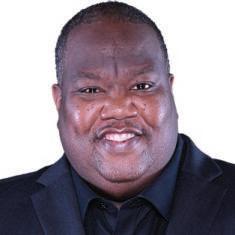
So either Jace Wilson, last year’s starting quarterback for all but the season opener, didn’t practice well enough or transfer KJ Cooper was better to earn the nod over the 2023 SWAC Newcomer of the Year.
But an injury to Cooper in the season-opening win over Prairie View has put Wilson back in control of the Tigers’
offense. Like last season, it hasn’t gone as smoothly for the junior from Mayde Creek, but this past Saturday night Wilson and his ability to lead put TSU in position to upend Grambling State, 24-17, comeback style at Shell Energy Stadium.
Wilson didn’t have eye-popping numbers but he made enough plays with his legs, arm and ability to think the game through to deliver the Tigers to their first win at Shell Energy Stadium this season.
“He commanded. He came in and took control,” Dishman said. “Jace has played a

lot of games here. He was not rattled when the score got tied. He just calmed the team down.”
Wilson, who was thrown into action last year when Andrew Body got injured, has been in every scenario imaginable. So it was nothing when the 5-foot-11 QB was suddenly faced with a 17-17 tie early in the fourth quarter.
The moment also wasn’t too big for Wilson late in the fourth quarter when the Tigers drove 75 yards and scored the go-ahead touchdown on Quinn Quintell’s two-yard touchdown run. In late-game situations where TSU has often fallen apart,

UH coach Kelvin Sampson has overseen J’wan Roberts’ growth in the program over six seasons.

this time Wilson’s leadership and knowledge helped the Tigers succeed.
During critical drives, Wilson quickly analyzed GSU’s defense and understood where the weakness was.
“Some of those situations when they dropped eight or dropped seven, nobody is accounting for the quarterback. So, when I drop back and I see everybody covered, the only thing I have left to do is hit the check down and take off,” said Wilson, who ran for 78 yards and a touchdown and passed for 128 yards on the day. “It’s just natural, just playing the game and not thinking too much and just being an athlete.”

By Jimmie Aggison
When you stand above 6 feet and weigh more than 200 pounds you are often introduced to the linebacker position with hopes of dominating through size. When you have the power and speed to go along with those measurables, you begin to catch the attention of those who run position
North Shore High School’s Charles Ross has not only dominated those position camps, but he’s also dominated in games and is now considered #1 in Texas and #2 in the nation at the linebacker position, according to 247 Sports.
“I feel I’m the top-rated linebacker in Texas because of my speed and my knowledge of the game,” said Ross.
Ross runs a 4.34 40-yard dash and 10.3 in the 100-meter dash. Last season, he was successful at making it to the UIL 6A state meet, where he placed 5th after running 10.56 in the 100-meter dash.
Ross understands that speed is important at the linebacker position because it allows the player to fly to the ball on both sides of the field while in pursuit. Ross studies the game of Harold Perkins, a junior LSU linebacker and Cy Park alum because he has the speed and quickness to rush off the edge.
“I watch Harold Perkins in college, and on the professional level I’m watching Fred Warner. They both have the ability to make plays all over the field,” said Ross.
Ross has played on the varsity level for three years, serving as one of North Shore’s defensive captains. As a junior, Ross accounted for two interceptions, one of which resulted in a pick-six, two pass breakups, six sacks, and 71 total tackles. He was named Second-Team All-District, and prior to the start of his senior season, he was named to the Touchdown Club of Houston 2024 High School Preseason Team.
“It’s an honor to be recognized as one of the top athletes in Houston,” said Ross.
Ross has done a phenomenal job continuously translating his off-season training to the field. He recently worked with Donnie Baggs, a former Texas A&M and Dallas Cowboys linebacker, and focused on proper technique to avoid getting jammed by bigger linemen.
“We worked on various linebacker drills such as pass rush, working in box, shock press and shed with correct hand placement. Now, I’m working on being in a position to apply more pressure on the quarterback,” said Ross.
The greatest piece of advice Ross has received were words from his grandfather that apply to life both on and off the field of play.
“He reminded me to always put God first and thank him for all he does,” said Ross. “I also like ‘Don’t let yesterday take up too much today.’ That was a quote by Will Rogers.”
While Ross has had success in his three-year run on varsity, he is reminded how far he has come with so many position changes.
“The toughest thing I’ve had to overcome was learning a new position each year,” said Ross. “My sophomore year, I played safety; junior year, I played inside linebacker; and now, senior year, I’m outside linebacker. However, playing various positions has made me versatile and has allowed me to add to my skill set.”
Ross chose LSU over several schools, including Yale, Cal Berkley, and the University of Pittsburgh, because of LSU’s coaching staff, school environment and academics.
“I know Coach Baker will develop and prepare me for the next level,” said Ross. “My goal while in college is to study industrial engineering, earn a degree, play football and have a good time while doing it.”
